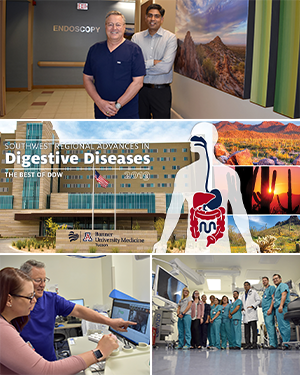 The University of Arizona Division of Gastroenterology and Hepatology will host an inaugural event to showcase “Southwest Regional Advances in Digestive Diseases: The Best of DDW,” a half-day conference to be held Saturday, Sept. 7, 2019, at the J.W. Marriott Tucson Star Pass Resort.
The University of Arizona Division of Gastroenterology and Hepatology will host an inaugural event to showcase “Southwest Regional Advances in Digestive Diseases: The Best of DDW,” a half-day conference to be held Saturday, Sept. 7, 2019, at the J.W. Marriott Tucson Star Pass Resort.
The event, which would run from 8 a.m. to 12:30 p.m. at the J.W. Marriott Starr Pass Resort, 3800 W. Starr Pass Blvd., borrows themes that arise from DDW, a large annual conference co-hosted by four big U.S. gastroenterological associations and societies that showcases updates on research, care and treatment of digestive diseases.
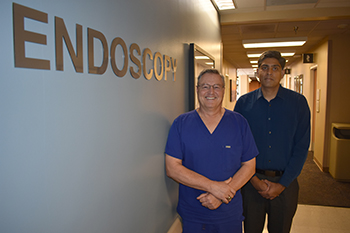 Course directors for the conference are GI’s Oleh Haluszka, MD, and Hemanth Gavini, MD, MPH.
Course directors for the conference are GI’s Oleh Haluszka, MD, and Hemanth Gavini, MD, MPH.
Dr. Haluszka, former gastroenterology chief Philadelphia’s Temple University Health System and GI endoscopy chief at the Fox Chase Cancer Center, joined the UA College of Medicine – Tucson faculty in August 2016, practicing at the Southern Arizona Health Care System. In January, he became a UA professor of medicine and the division’s associate chief and joined the staff at Banner – University Medicine Tucson.
Dr. Gavini is medical director of GI endoscopy services at the division.
“We have noted that there are few ongoing gastroenterology continuing medical education (CME) programs in the U.S. Southwest to enable community-based physicians and other providers to learn the latest developments in gastroenterology and hepatology without taking time from their busy practices to attend national meetings,” said Dr. Haluszka.
“Since the majority of us go to these meetings, we wanted a summary way to introduce key concepts that were discussed with physicians in the community… who deal with digestive disease to let them know how the science is progressing as we develop new clinical tools,” he added.
For more detail, see the Q&A with Dr. Haluszka further below.
Where, When and How Much?
Southwest Regional Advances in Digestive Diseases: The Best of DDW
 J.W. Marriott Starr Pass Resort
J.W. Marriott Starr Pass Resort
3800 W. Starr Pass Blvd.
Tucson, AZ 85745
(877) 622-3140 | (520) 792-3500
Saturday, Sept. 27, 2019 | 8 a.m.–12:30 p.m.
The conference is directed toward physicians, surgeons, nurses, nurse practitioners, physician assistants and technicians in gastroenterology, as well as fellows and residents with an interest in the topic. The cost is $50 for physicians, $25 for mid-level clinical professionals, nurses and clinical practice administrators. Attendance by residents and fellows is free, but a certificate of documentation on their training status is required.
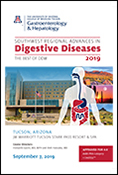 Up to four continuing education credits are available to physicians and nurses through the UA College of Medicine – Tucson and UA College of Nursing. See below for details.
Up to four continuing education credits are available to physicians and nurses through the UA College of Medicine – Tucson and UA College of Nursing. See below for details.
For additional information, visit the SWRADD website: deptmedicine.arizona.edu/SWRADD2019 or email: SWRADD@deptofmed.arizona.edu
Showcasing a Who’s Who in GI
The SWRADD Conference program offers a virtual who’s who of GI treatment from the UA-Banner and UA-VA clinical alliances. Just look at the agenda for that.
AGENDA (click here or on image at right for program  ):
): 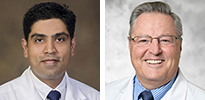
- 7:30-8:00 | Registration & Continental Breakfast
- 8:00-8:05 | Welcome & Introductions – Hemanth Gavini, MD, MPH, and Oleh Haluszka, MD
- 8:05-8:25 | “Seeing Is Believing: New Imaging Technology and the Emerging AI in Endoscopy” – Bhaskar Banerjee, MD
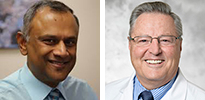 (past division chief and director, UA Gastroenterology Fellowship Program)
(past division chief and director, UA Gastroenterology Fellowship Program) - 8:25-8:45 | “Burning Issues in Barrett’s Esophagus” – Oleh Haluszka, MD
- 8:45-9:05 | “What’s Moving in Esophageal and Gastric Motility” – George Fantry, MD (gastroenterologist and senior associate dean, Student Affairs & Admissions, UA College of Medicine – Tucson)
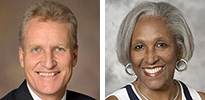 9:05-9:25 | “The Future of GI Cancer Therapy: From Bench to Bedside” – Juanita Merchant, MD, PhD (chief, UA Division of Gastroenterology and Hepatology)
9:05-9:25 | “The Future of GI Cancer Therapy: From Bench to Bedside” – Juanita Merchant, MD, PhD (chief, UA Division of Gastroenterology and Hepatology)- 9:25-9:55 | “Therapeutic Endoscopy: Exploring the New Frontier” – Hemanth Gavini, MD, MPH
- 9:55-10:20 | Break/Visit Exhibits
- 10:20-10:40 | “The Cutting Edge in Surgery” – Taylor Riall, MD, PhD, FACS
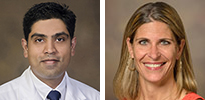 (interim chair, UA Department of Surgery, and chief, Division of General Surgery/Surgical Oncology)
(interim chair, UA Department of Surgery, and chief, Division of General Surgery/Surgical Oncology) - 10:40-11:00 | “Treatment Options in Irritable bowel syndrome (IBS)” – Eugene Trowers, MD, MPH, FACP
- 11:00-11:20 | “Diving into the Microbiome” – Michael Gavin, MD (UA associate professor and staff physician, Southern Arizona VA Health Care System, Division of Gastroenterology)
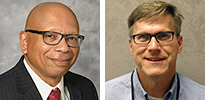
- 11:20-11:45 | “Liver Disease Updates” – Michael Fallon, MD, FACP (chair, Department of Medicine, UA College of Medicine – Phoenix)
- 1:45-12:05 | “Pathogenesis of Inflammatory Bowel Disease (IBD)” – Fayez Ghishan, MD (chair, UA Department of Pediatrics, UA College of Medicine – Tucson)
 12:05-12:30 | “The New Age of IBD Therapy” – Sasha Taleban, MD (medical director, UA Inflammatory Bowel Disease Program)
12:05-12:30 | “The New Age of IBD Therapy” – Sasha Taleban, MD (medical director, UA Inflammatory Bowel Disease Program)- 12:30-1:00 | Break/Exhibitors
- 1:00 – 2:00 | Lunch
- 2:00-2:30 | Exhibitors
The full SWRADD program, including presentations and additional documentation, will be available on a business-card-shaped thumb drive, courtesy of conference co-sponsors:
Learning Objectives
- Utilize new endoscopic therapies for patients with a number of digestive disorders.
- Utilize new therapies for patients with IBD based on improved understanding of the pathogenesis of the disorder.
- Incorporate into practice new developments in GI motility that can provide improved patient outcomes.
- Incorporate into practice multimodality treatment of GI cancer.
- Incorporate into practice new treatments affecting the microbiome.
Continuing Education Credits
The University of Arizona College of Medicine – Tucson is accredited by the Accreditation Council for Continuing Medical Education (ACCME) to provide continuing medical education for physicians.
The University of Arizona College of Medicine – Tucson designates this live activity for a maximum of 4.0 AMA PRA Category 1 Credit(s)™. Physicians should claim only the credit commensurate with the extent of their participation in the activity.
The University of Arizona College of Nursing Continuing Professional Education Unit is an approved provider of continuing nursing education by the Continuing Nursing Education Group, an accredited approver by the American Nurses Credentialing Center’s Commission on Accreditation.
The University of Arizona College of Nursing Continuing Professional Education Unit information: up to 4.0 contact hours for continuing nursing education. This educational activity is jointly provided by the University of Arizona College of Medicine and the University of Arizona College of Nursing Continuing Professional Education Unit.
Q&A with Dr. Oleh Haluszka on SWRADD
Q: How did this all get started? 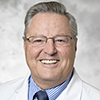
Dr. Haluszka: Well, I joined the faculty here about five months ago. Before that, I was chief of GI at Temple in Philadelphia, and I found that this was kind of a useful way to let the community know what our faculty and staff were doing. It’s a good way to introduce faculty to the community and establish better lines of communication.
Q: As it was originally explained to me, the purpose of such an event locally was to be able to transfer those ideas, new practices and procedures and information on the latest research from a big national conference like Digestive Diseases Week, which is hosted by the American Gastroenterological Association and a few other big groups like that, to local community physicians practicing in the area. How would you explain it?
Dr. Haluszka: DDW is the big annual meeting in the United States of gastroenterologists. It’s actually an international meeting of some 16,000 physicians. That can be very hard for doctors in community practices to take off four or five days to go to a meeting like that which is scattered around the country in different years. For university programs, though, it’s almost mandatory for us to go to keep up on the research in our field and latest practices as well as to present on what we’re doing.
Since the majority of us go to these meetings, we wanted a summary way to introduce key concepts that were discussed with physicians in the community, and not just for gastroenterologists, but for surgeons, nurse practitioners, etc., who deal with digestive disease to let them know how the science is progressing as we develop new clinical tools both for endoscopy, which is what I do, and for new medications for inflammatory bowel disease. So, it’s sort of a brief, comprehensive update in a variety of GI fields, because GI encompasses a lot.
Q: At these events, they often deal with what are the latest procedures or trends in the market and even what are points of controversy or debate. Is that going to somehow going to be encompassed in this as well?
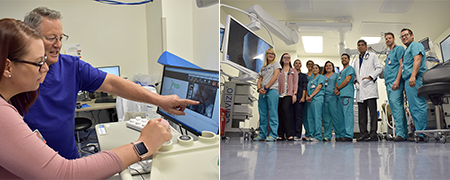 Dr. Haluszka: Yes, exactly. You know, for example, I’m reviewing Barrett’s esophagus, which is a potentially pre-cancerous condition that leads to esophageal cancer. Esophageal cancer has been rising in the Western countries over the last three or four decades. It turns out we can potentially prevent that by treating this pre-malignant condition called Barrett’s esophagus and there are a variety of treatments to deal with it. You can burn it using radiofrequency ablation. There’s a relatively new tool that we’re getting data on called cryotherapy, which is something I had experience on before.
Dr. Haluszka: Yes, exactly. You know, for example, I’m reviewing Barrett’s esophagus, which is a potentially pre-cancerous condition that leads to esophageal cancer. Esophageal cancer has been rising in the Western countries over the last three or four decades. It turns out we can potentially prevent that by treating this pre-malignant condition called Barrett’s esophagus and there are a variety of treatments to deal with it. You can burn it using radiofrequency ablation. There’s a relatively new tool that we’re getting data on called cryotherapy, which is something I had experience on before.
CAPTION: Dr. Haluszka (left) discusses imaging results; Dr. Gavini with the UA/Banner Endoscopy Services team (click to enlarge image).
Q: So, in other words, you freeze it instead?
Dr. Haluszka: Freeze it, exactly. We will be getting the ability to do that procedure here hopefully within the next few weeks to start being able to offer that to patients. And, again, it’s technology that can be used for other indications as well. We see our role as sort of the reference hospital for things like this in the area to let them know what’s going to be available — and maybe not just from us, too, in the future.
Q: Do you know if that procedure is offered anywhere else here?
Dr. Haluszka: Not in Tucson.
Q: Great. Please keep me up to date on when that’s going to happen. It’d be great to get a photo of the equipment being installed.
Dr. Haluszka: Definitely. It’s been approved way before the actual purchase to get it here.
Q: How many people are we anticipating for this conference?
Dr. Haluszka: Having done this previously at other places where I’ve worked, you kind of aim for about 100 people. I can tell you that we’ve already gotten a lot of feedback for it already so, for the first year, we’re looking at from 100 to 150 registrants.
Q: Coming from how far and wide?
Dr. Haluszka: From as far as Yuma, for one. There was some interest also from folks in Las Vegas, when we sent out cards announcing our plans. But the idea is to kind of make this the Southwest regional conference on updates in digestive diseases and their care. Eventually, we’re looking at folks coming from as far as Colorado, Las Vegas, Albuquerque, and maybe El Paso, Texas.
Q: How big is the program and what does it entail?
Dr. Haluszka: We’re looking at 4.0 hours of CME, so the way we’ve structured it is a series of ten 20-30 minute talks, depending on the topic. But it’s very much to the point of giving a little bit of background on the disease, for example, Barrett’s, and here’s what’s new and coming soon about this. Here’s what you should be aware of in the next few years.
Q: Do we have any notable stuff that should be mentioned in that program?
Dr. Haluszka: Well, it’s all notable. It’s all new stuff. You know, there’s a variety. One of the key things for us is, you know, the faculty here are primarily clinical researchers. We do have Dr. Juanita Merchant, who’s he chief of the section, who does new, very important genomic translational work for gastric cancer. One of the things we want to showcase to the community is how that’s going to impact the practice of GI in the future. Gastric cancer is of particular interest in the Southwest because, it turns out, it’s highly prevalent in the Native American populations which, obviously, have quite a significant presence in the region.
Q: Why is that occurring?
Dr. Haluszka: It’s not totally clear. That’s something we’re starting to look at now. It may be related to infection with a bacteria called H. pylori, but we’re finding more and more data that Native Americans have a very high risk of developing this type of cancer.
Q: And we’re working toward developing more targeted precision medicine therapies to address that?
Dr. Haluszka: Exactly. That’s the ultimate goal, precision medicine solutions to address that and to introduce that to the GI community that it’s not just do surgery and cut out the stomach but we may be able to develop specific therapies and that’s how it’s done.
And again on the topics, because GI is kind of a broad field, we also have somebody talking about liver disease, somebody talking about inflammatory bowel disease… Dr. Gavini, our director of Endoscopy, is going to be talking about endoscopic therapies, some of which we already have adopted here. You know, so it covers a wide range of topics.
Q: I would guess that Dr. Taleban will be discussing IBD. Who’s going to be talking about liver disease?
Dr. Haluszka: We’re bringing in Dr. Mike Fallon from Phoenix. He’s the chair of medicine (at the UA College of Medicine – Phoenix and Banner – University Medical Center Phoenix) as well as being the hepatologist in charge of the program there.

